高中英语人教必修5Unit 4 Making the news Learning about Language 课件(39张)
文档属性
| 名称 | 高中英语人教必修5Unit 4 Making the news Learning about Language 课件(39张) | 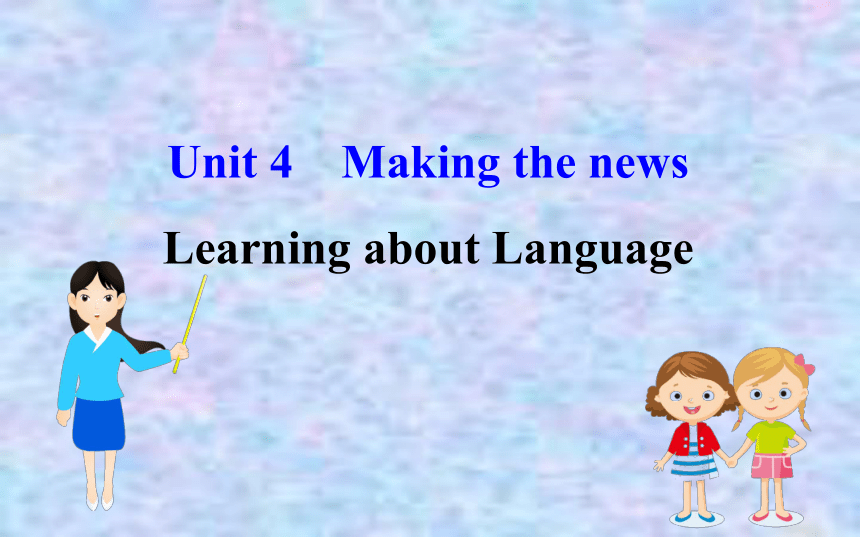 | |
| 格式 | zip | ||
| 文件大小 | 1.4MB | ||
| 资源类型 | 教案 | ||
| 版本资源 | 人教版(新课程标准) | ||
| 科目 | 英语 | ||
| 更新时间 | 2020-03-07 12:01:15 | ||
图片预览

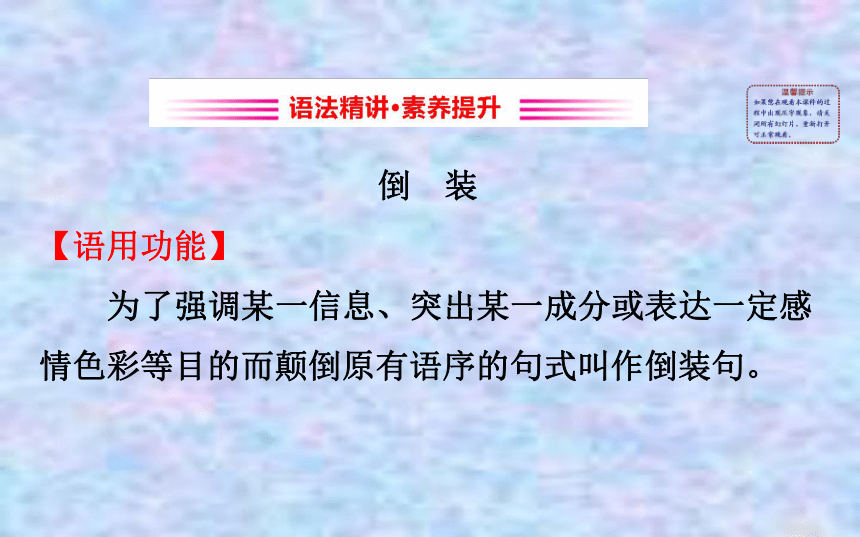
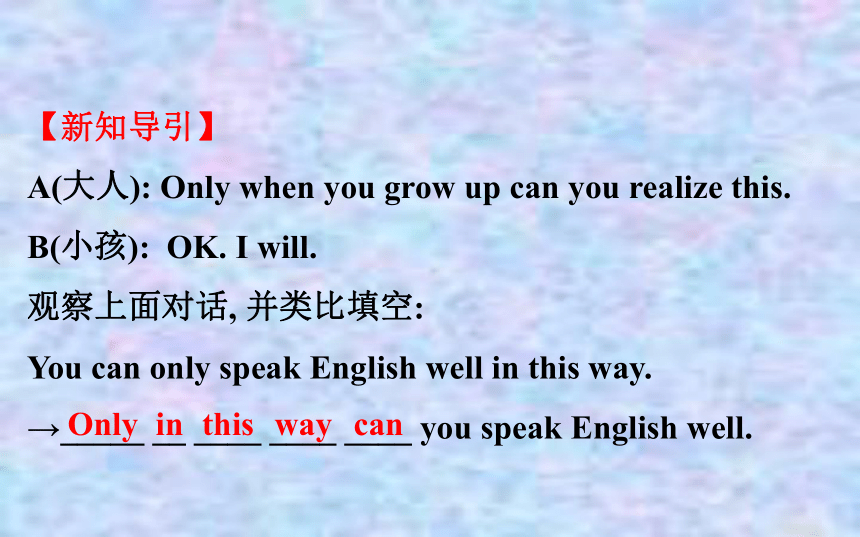
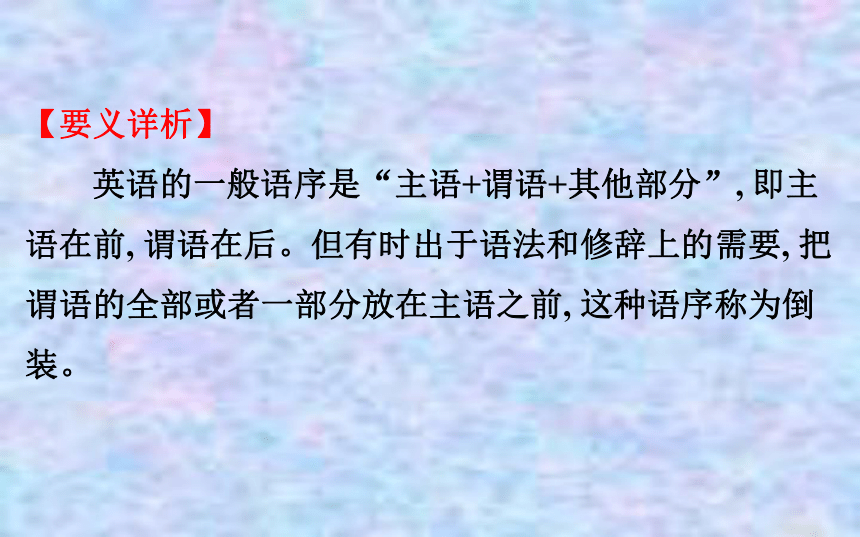
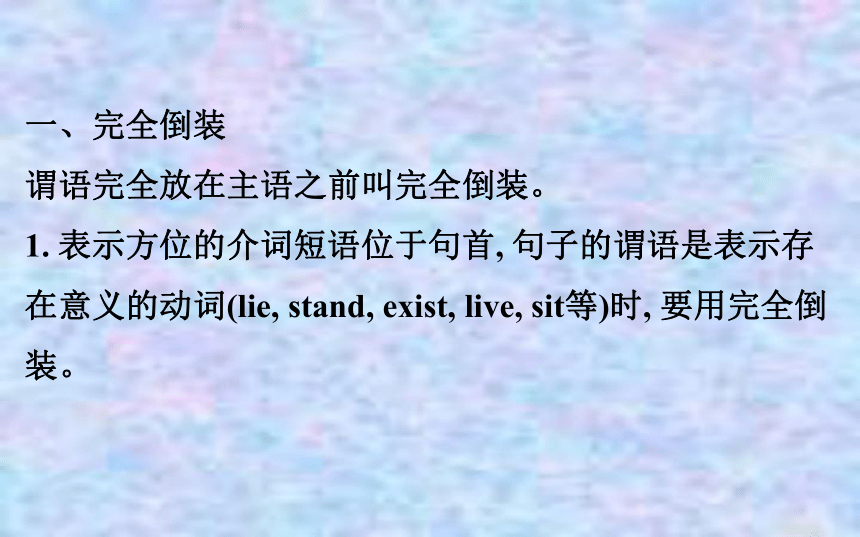
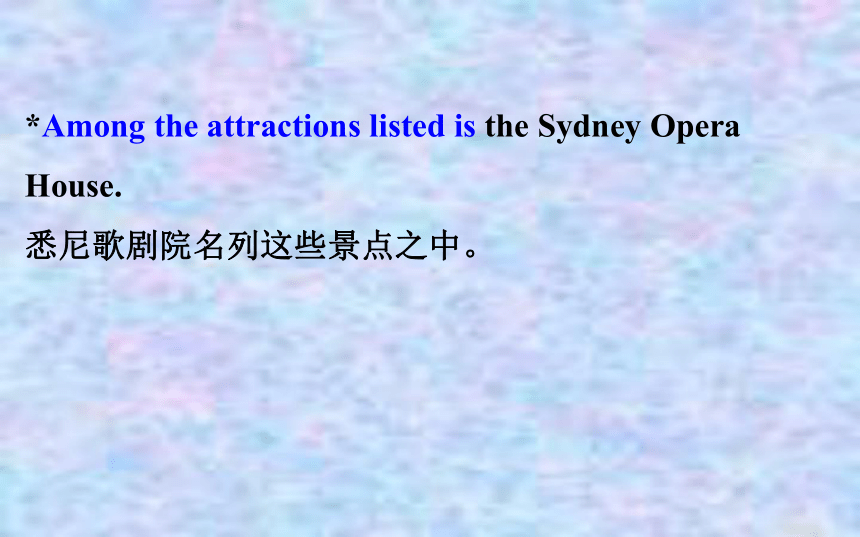
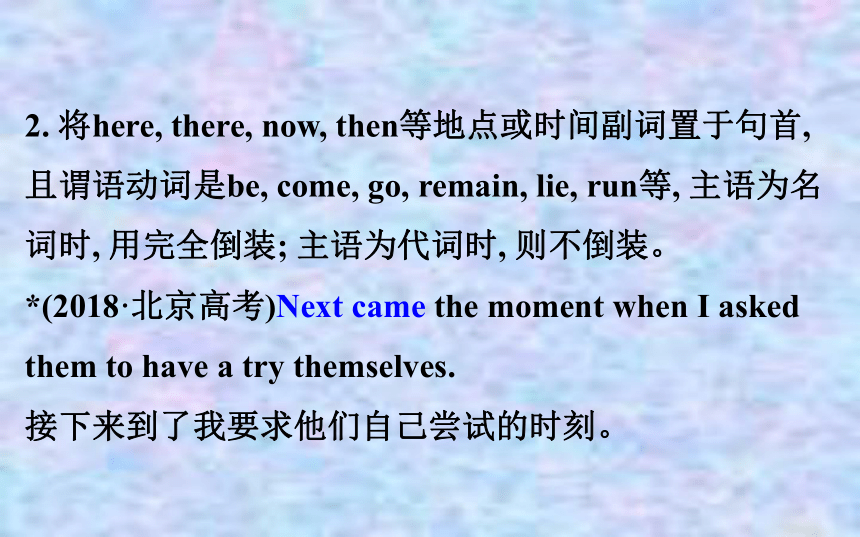

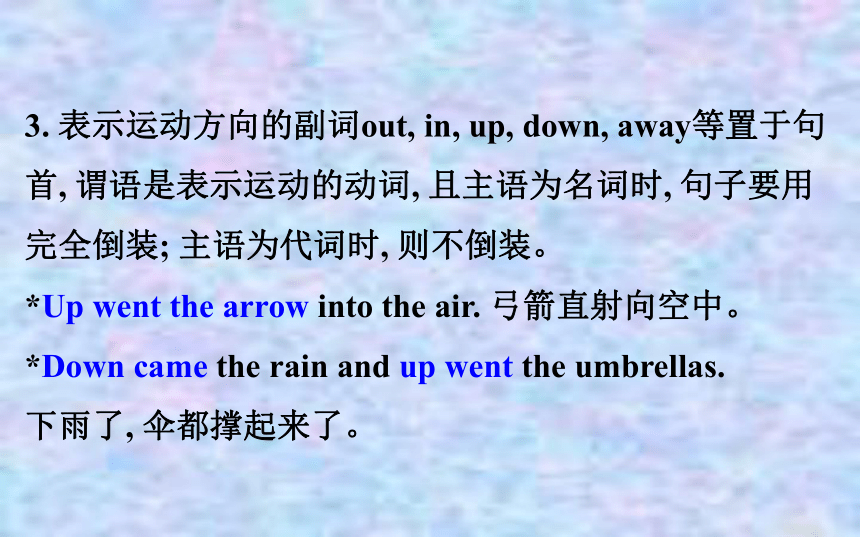
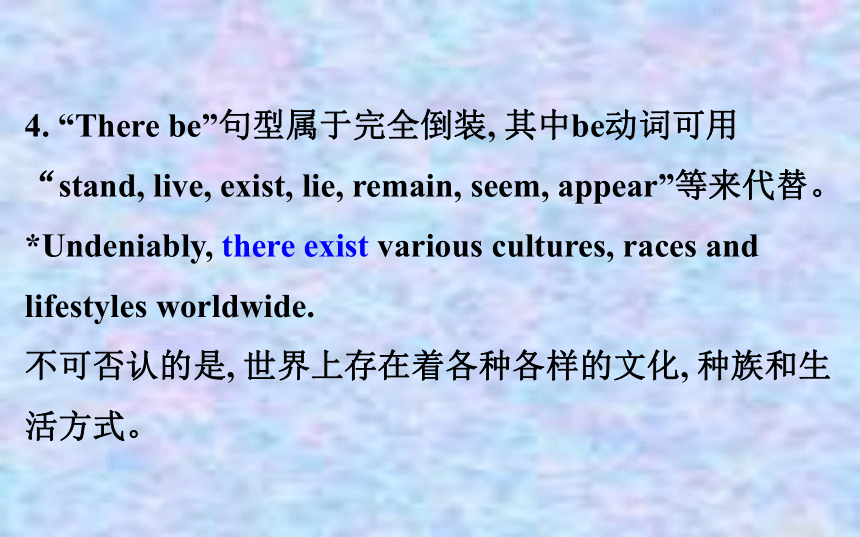
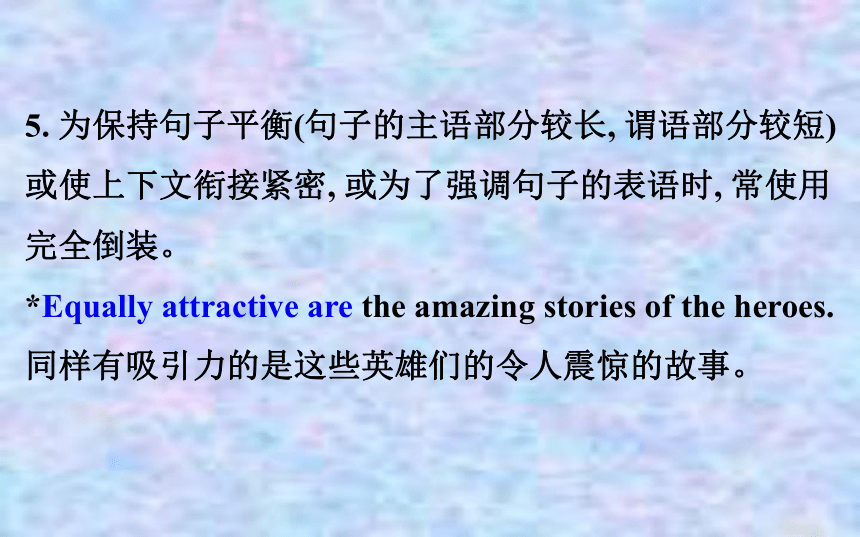
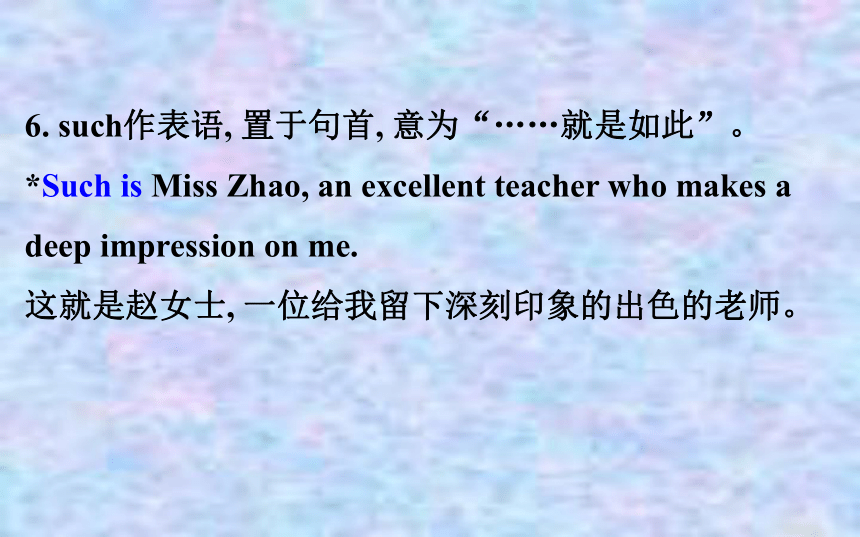
文档简介
课件39张PPT。Unit 4 Making the news
Learning about Language 倒 装
【语用功能】
为了强调某一信息、突出某一成分或表达一定感彩等目的而颠倒原有语序的句式叫作倒装句。【新知导引】
A(大人): Only when you grow up can you realize this.
B(小孩): OK. I will.
观察上面对话, 并类比填空:
You can only speak English well in this way.
→_____ __ ____ ____ ____ you speak English well. Onlyinthiswaycan【要义详析】
英语的一般语序是“主语+谓语+其他部分”, 即主语在前, 谓语在后。但有时出于语法和修辞上的需要, 把谓语的全部或者一部分放在主语之前, 这种语序称为倒装。 一、完全倒装
谓语完全放在主语之前叫完全倒装。
1. 表示方位的介词短语位于句首, 句子的谓语是表示存在意义的动词(lie, stand, exist, live, sit等)时, 要用完全倒装。*Among the attractions listed is the Sydney Opera House.
悉尼歌剧院名列这些景点之中。2. 将here, there, now, then等地点或时间副词置于句首, 且谓语动词是be, come, go, remain, lie, run等, 主语为名词时, 用完全倒装; 主语为代词时, 则不倒装。
*(2018·北京高考)Next came the moment when I asked them to have a try themselves.
接下来到了我要求他们自己尝试的时刻。*Then followed a tour of China National Tea Museum, where we learned the history of tea making.
随后是参观中国国家茶博物馆, 在那里我们会学习制茶历史。3. 表示运动方向的副词out, in, up, down, away等置于句首, 谓语是表示运动的动词, 且主语为名词时, 句子要用完全倒装; 主语为代词时, 则不倒装。
*Up went the arrow into the air. 弓箭直射向空中。
*Down came the rain and up went the umbrellas.
下雨了, 伞都撑起来了。4. “There be”句型属于完全倒装, 其中be动词可用“stand, live, exist, lie, remain, seem, appear”等来代替。
*Undeniably, there exist various cultures, races and lifestyles worldwide.
不可否认的是, 世界上存在着各种各样的文化, 种族和生活方式。5. 为保持句子平衡(句子的主语部分较长, 谓语部分较短)或使上下文衔接紧密, 或为了强调句子的表语时, 常使用完全倒装。
*Equally attractive are the amazing stories of the heroes.
同样有吸引力的是这些英雄们的令人震惊的故事。6. such作表语, 置于句首, 意为“……就是如此”。
*Such is Miss Zhao, an excellent teacher who makes a deep impression on me.
这就是赵女士, 一位给我留下深刻印象的出色的老师。【巧学助记】 七言记完全倒装
副介开头全倒装, 遇到代词则照常。
方位方式别遗忘, 上下进出往前放。
there, here用得上, 时间顺序句首放。
表语句首主语长, 句子平衡需倒装。【即学活用】
(1)__ ___ ____ __ ______ __ _______ a fascinating city
—Qingdao.
在中国东部坐落着一个迷人的城市——青岛。IntheeastofChinaislocated(2)_____ ______ the regret that they chose a wrong
career.
接下来的遗憾是他们选择了错误的职业。
(3)Now, _____ ___ ___ ____ when we followed their
steps.
现在, 我们遵循他们步伐的日子一去不复返了。Nextcomesgonearethedays二、部分倒装
将谓语的一部分(助动词或情态动词)置于主语之前, 即构成部分倒装。1. 一般疑问句皆为部分倒装。
*(2019·全国卷Ⅱ)If others benefit in the process, and I get some reward too, does it really matter where my motivation lies? 只要有人在这个过程中获益, 自己也有所收获, 我的动机是什么还重要吗? 2. 将never, hardly, seldom, scarcely, barely, little, not, nowhere, by no means, in no way, at no time, in no case等表示否定或半否定意义的词或词组置于句首时, 句子要用部分倒装。*Hardly does it rain but whenever it does, it rains heavily.
这儿几乎不下雨, 但是每当下雨的时候, 就会下大雨。*I don’t see much talent in myself, and by no means am I likely to become a master like Edison or Lu Xun.
我没看到自己有多少天赋, 我也绝不可能成为爱迪生或鲁迅那样的大师。3. “so/nor/neither+助动词/be动词/情态动词+主语”结构为部分倒装。
*(2019·全国卷Ⅲ)The most famous designers are Chinese, so are the models, and so are the consumers.
最著名的设计师是中国人, 最著名的模特和最庞大的消费群体也是中国人。*My father doesn’t smoke; nor/neither does her father.
我父亲不吸烟, 她的父亲也不吸烟。【易错精点】
“so+助动词/be动词/情态动词+主语”结构强调前面所表述的情况也适用于另一主语, 但是该结构中的主语与前面的主语不一致。4. 将not until, “only+状语(副词、介宾短语或从句)”置于句首时, 句子要用部分倒装。
*Not until we went back to the hotel did we realize my father’s wallet was missing.
直到我们回到宾馆才意识到我爸爸的钱包丢了。*(2019·浙江高考)Only on special occasions(场合)would they take it out and let us hold it in our hands.
只有在特别的场合, 他们才会把它拿出来, 让我们摸一摸。5. 在“so/such. . . that. . . ”句型中, 将“so/such+所修饰成分”置于句首时, 主句要用部分倒装。
*Such a good opportunity is it that you shall never miss it.
这是一个如此好的机会, 你千万不要错过。*(2017·全国卷Ⅰ)So nervous was I that I could hardly tell which direction was left.
我如此着急以至于分辨不清哪边是左。6. not only. . . but also. . . 引导两个并列分句, not only置于句首时, not only所在的分句需用倒装, but also所在的分句不用倒装; 而 neither. . . nor. . . 引导两个并列分句时, 两个分句都需要倒装。*(2019·北京高考)Not only will you help our young volunteers to develop personally, you’ll also learn new skills.
你不仅能帮助我们年轻志愿者提高自己, 你也会学到新的技能。7. 在no sooner. . . than. . . , hardly/scarcely. . . when. . . 结构中, no sooner, hardly/scarcely位于句首时, 主句倒装, 从句不倒装。
*(2019·天津高考)No sooner did she leave my doorstep than I had emails from two women.
她刚离开我的门阶, 我就收到两位女士发来的邮件。8. as引导的让步状语从句必须部分倒装, though引导的让步状语从句可倒装也可不倒装, 其倒装形式为: 形容词/副词/名词/动词+as/though+主语+谓语。
*Busy as people are, everyone should go back home to accompany their parents as often as possible.
尽管很忙, 但是每一个人都应该经常回家陪伴父母。9. 虚拟条件句中, if引导的条件从句中若有were, had, should, 可省去if, 把were, had, should提到主语之前, 构成部分倒装。
*Were I the classmate of the girl, I would tell her that physical beauty is by birth, but inner beauty is cultivated after birth. 如果我是这个女孩的同学, 我会告诉她外在美是天生的, 而内在美是后天养成的。10. 部分倒装还用于某些表示祝愿的句子中。
*May you have an unforgettable tourist experience!
祝你拥有一次难忘的旅游经历。【巧学助记】 口诀记部分倒装
only修饰副、介、状, 位于句首半倒装。
否定意义副连词, 放在句首也同样。
not only开头句, 前一分句须倒装。
had, were, should虚拟句, 省略if半倒装。
注: 半倒装=部分倒装。【即学活用】
(1)_____ _______ __ _______ ___(尽管天津拥有一个短
暂的历史), it doesn’t mean Tianjin is lack for traditional
customs.
(2)____ ___ ______ _____(要是医生来了) last night, the
boy would have been saved. ShorthistoryasTianjinhasHadthedoctorcome(3)No tourist will miss the local food in Xi’an, ____ ____
___(我们也不会).
(4)_____ _ __ ___(如果我将去) to the moon one day, I
would see it with my own eyes. norwillweWereItogo【补偿训练】
1. Little did she knew Tom was badly ill.
( )
2. All around the fox in a circle was dogs. ( )
3. On the wall hangs two maps, which are practical.
( )knew→knowwas→werehangs改为hang4. So fast did light travel that we can hardly imagine its
speed. ( )
5. Just by keeping down costs will Power Data hold its
advantage over other companies. ( )did改为doesJust改为Only
Learning about Language 倒 装
【语用功能】
为了强调某一信息、突出某一成分或表达一定感彩等目的而颠倒原有语序的句式叫作倒装句。【新知导引】
A(大人): Only when you grow up can you realize this.
B(小孩): OK. I will.
观察上面对话, 并类比填空:
You can only speak English well in this way.
→_____ __ ____ ____ ____ you speak English well. Onlyinthiswaycan【要义详析】
英语的一般语序是“主语+谓语+其他部分”, 即主语在前, 谓语在后。但有时出于语法和修辞上的需要, 把谓语的全部或者一部分放在主语之前, 这种语序称为倒装。 一、完全倒装
谓语完全放在主语之前叫完全倒装。
1. 表示方位的介词短语位于句首, 句子的谓语是表示存在意义的动词(lie, stand, exist, live, sit等)时, 要用完全倒装。*Among the attractions listed is the Sydney Opera House.
悉尼歌剧院名列这些景点之中。2. 将here, there, now, then等地点或时间副词置于句首, 且谓语动词是be, come, go, remain, lie, run等, 主语为名词时, 用完全倒装; 主语为代词时, 则不倒装。
*(2018·北京高考)Next came the moment when I asked them to have a try themselves.
接下来到了我要求他们自己尝试的时刻。*Then followed a tour of China National Tea Museum, where we learned the history of tea making.
随后是参观中国国家茶博物馆, 在那里我们会学习制茶历史。3. 表示运动方向的副词out, in, up, down, away等置于句首, 谓语是表示运动的动词, 且主语为名词时, 句子要用完全倒装; 主语为代词时, 则不倒装。
*Up went the arrow into the air. 弓箭直射向空中。
*Down came the rain and up went the umbrellas.
下雨了, 伞都撑起来了。4. “There be”句型属于完全倒装, 其中be动词可用“stand, live, exist, lie, remain, seem, appear”等来代替。
*Undeniably, there exist various cultures, races and lifestyles worldwide.
不可否认的是, 世界上存在着各种各样的文化, 种族和生活方式。5. 为保持句子平衡(句子的主语部分较长, 谓语部分较短)或使上下文衔接紧密, 或为了强调句子的表语时, 常使用完全倒装。
*Equally attractive are the amazing stories of the heroes.
同样有吸引力的是这些英雄们的令人震惊的故事。6. such作表语, 置于句首, 意为“……就是如此”。
*Such is Miss Zhao, an excellent teacher who makes a deep impression on me.
这就是赵女士, 一位给我留下深刻印象的出色的老师。【巧学助记】 七言记完全倒装
副介开头全倒装, 遇到代词则照常。
方位方式别遗忘, 上下进出往前放。
there, here用得上, 时间顺序句首放。
表语句首主语长, 句子平衡需倒装。【即学活用】
(1)__ ___ ____ __ ______ __ _______ a fascinating city
—Qingdao.
在中国东部坐落着一个迷人的城市——青岛。IntheeastofChinaislocated(2)_____ ______ the regret that they chose a wrong
career.
接下来的遗憾是他们选择了错误的职业。
(3)Now, _____ ___ ___ ____ when we followed their
steps.
现在, 我们遵循他们步伐的日子一去不复返了。Nextcomesgonearethedays二、部分倒装
将谓语的一部分(助动词或情态动词)置于主语之前, 即构成部分倒装。1. 一般疑问句皆为部分倒装。
*(2019·全国卷Ⅱ)If others benefit in the process, and I get some reward too, does it really matter where my motivation lies? 只要有人在这个过程中获益, 自己也有所收获, 我的动机是什么还重要吗? 2. 将never, hardly, seldom, scarcely, barely, little, not, nowhere, by no means, in no way, at no time, in no case等表示否定或半否定意义的词或词组置于句首时, 句子要用部分倒装。*Hardly does it rain but whenever it does, it rains heavily.
这儿几乎不下雨, 但是每当下雨的时候, 就会下大雨。*I don’t see much talent in myself, and by no means am I likely to become a master like Edison or Lu Xun.
我没看到自己有多少天赋, 我也绝不可能成为爱迪生或鲁迅那样的大师。3. “so/nor/neither+助动词/be动词/情态动词+主语”结构为部分倒装。
*(2019·全国卷Ⅲ)The most famous designers are Chinese, so are the models, and so are the consumers.
最著名的设计师是中国人, 最著名的模特和最庞大的消费群体也是中国人。*My father doesn’t smoke; nor/neither does her father.
我父亲不吸烟, 她的父亲也不吸烟。【易错精点】
“so+助动词/be动词/情态动词+主语”结构强调前面所表述的情况也适用于另一主语, 但是该结构中的主语与前面的主语不一致。4. 将not until, “only+状语(副词、介宾短语或从句)”置于句首时, 句子要用部分倒装。
*Not until we went back to the hotel did we realize my father’s wallet was missing.
直到我们回到宾馆才意识到我爸爸的钱包丢了。*(2019·浙江高考)Only on special occasions(场合)would they take it out and let us hold it in our hands.
只有在特别的场合, 他们才会把它拿出来, 让我们摸一摸。5. 在“so/such. . . that. . . ”句型中, 将“so/such+所修饰成分”置于句首时, 主句要用部分倒装。
*Such a good opportunity is it that you shall never miss it.
这是一个如此好的机会, 你千万不要错过。*(2017·全国卷Ⅰ)So nervous was I that I could hardly tell which direction was left.
我如此着急以至于分辨不清哪边是左。6. not only. . . but also. . . 引导两个并列分句, not only置于句首时, not only所在的分句需用倒装, but also所在的分句不用倒装; 而 neither. . . nor. . . 引导两个并列分句时, 两个分句都需要倒装。*(2019·北京高考)Not only will you help our young volunteers to develop personally, you’ll also learn new skills.
你不仅能帮助我们年轻志愿者提高自己, 你也会学到新的技能。7. 在no sooner. . . than. . . , hardly/scarcely. . . when. . . 结构中, no sooner, hardly/scarcely位于句首时, 主句倒装, 从句不倒装。
*(2019·天津高考)No sooner did she leave my doorstep than I had emails from two women.
她刚离开我的门阶, 我就收到两位女士发来的邮件。8. as引导的让步状语从句必须部分倒装, though引导的让步状语从句可倒装也可不倒装, 其倒装形式为: 形容词/副词/名词/动词+as/though+主语+谓语。
*Busy as people are, everyone should go back home to accompany their parents as often as possible.
尽管很忙, 但是每一个人都应该经常回家陪伴父母。9. 虚拟条件句中, if引导的条件从句中若有were, had, should, 可省去if, 把were, had, should提到主语之前, 构成部分倒装。
*Were I the classmate of the girl, I would tell her that physical beauty is by birth, but inner beauty is cultivated after birth. 如果我是这个女孩的同学, 我会告诉她外在美是天生的, 而内在美是后天养成的。10. 部分倒装还用于某些表示祝愿的句子中。
*May you have an unforgettable tourist experience!
祝你拥有一次难忘的旅游经历。【巧学助记】 口诀记部分倒装
only修饰副、介、状, 位于句首半倒装。
否定意义副连词, 放在句首也同样。
not only开头句, 前一分句须倒装。
had, were, should虚拟句, 省略if半倒装。
注: 半倒装=部分倒装。【即学活用】
(1)_____ _______ __ _______ ___(尽管天津拥有一个短
暂的历史), it doesn’t mean Tianjin is lack for traditional
customs.
(2)____ ___ ______ _____(要是医生来了) last night, the
boy would have been saved. ShorthistoryasTianjinhasHadthedoctorcome(3)No tourist will miss the local food in Xi’an, ____ ____
___(我们也不会).
(4)_____ _ __ ___(如果我将去) to the moon one day, I
would see it with my own eyes. norwillweWereItogo【补偿训练】
1. Little did she knew Tom was badly ill.
( )
2. All around the fox in a circle was dogs. ( )
3. On the wall hangs two maps, which are practical.
( )knew→knowwas→werehangs改为hang4. So fast did light travel that we can hardly imagine its
speed. ( )
5. Just by keeping down costs will Power Data hold its
advantage over other companies. ( )did改为doesJust改为Only
